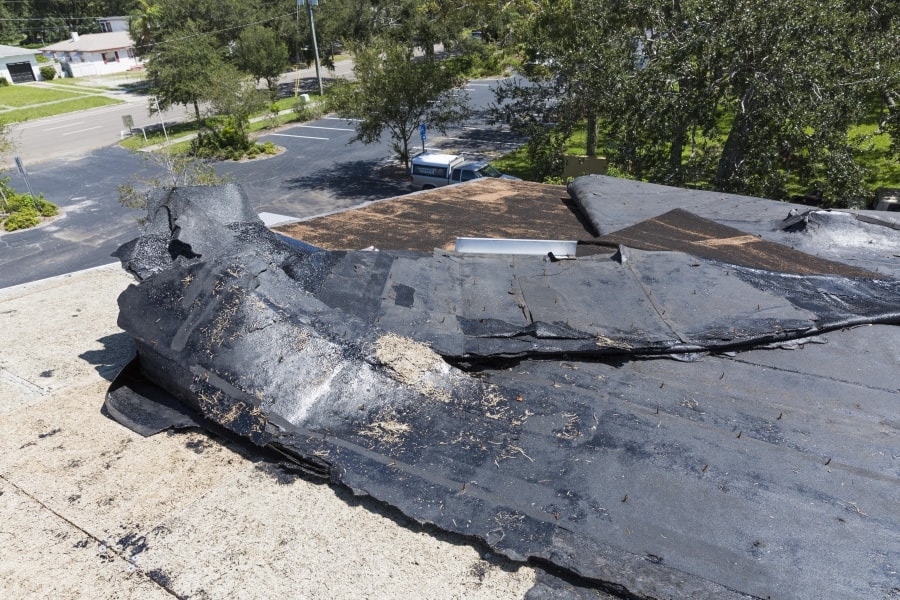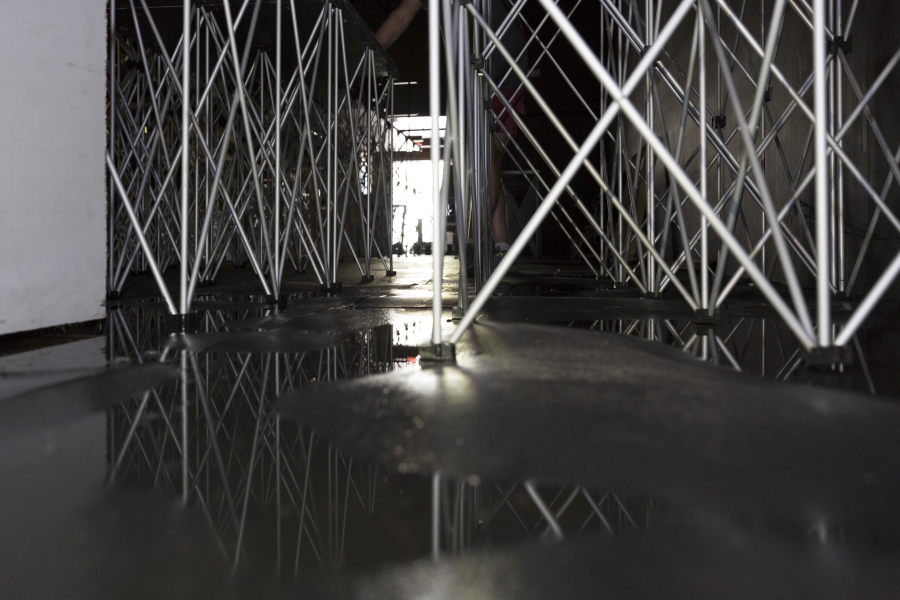Sun as hot as a klieg light pounded down from blue skies worthy of a cyclorama this week as Florida theatres struggled to find a comparatively normal rhythm in the wake of Hurricane Irma.
But “comparatively” meant hauling equipment from a black box whose roof had been torn away, a darkened dinner theatre using a Pennsylvania troupe’s box office to process tickets, a conservatory rehearsing both in a hotel and in another theatre’s volunteered space. It also meant endless hours of staff and volunteers cleaning up small mountains of debris.
Most theatres across the state postponed or outright cancelled performances, costing crucial cash flow. Some rehearsal schedules were cut short so that performers and staff could take shelter—sometimes inside the theatre itself. Some evacuated.
The impact was far more profound for some, such as a community theatre in the Middle Keys whose venue was damaged so severely that it shuttered for the season.
While some theatres could not be contacted because phone and power service still were absent Tuesday, managers at some of the most seriously affected theatres considered themselves blessed that they avoided the severity of damage suffered by the Houston’s Alley Theatre. Forecasters predicted much, much worse, especially in the Miami-Fort Lauderdale-West Palm Beach area, which was hammered but escaped with minimal damage.
“We got ridiculously lucky,” said Jim Sorensen, operations manager at American Stage in St. Petersburg.
Irma left most theatres in the state without power and internet service from three days to well over a week, crippling their ability to conduct business. Many had minor structural damage from flying tree limbs and interior flooding from the rainfall. But the wind that raged and cracked its cheeks at top speeds of 140 mph caused catastrophic damage to only a handful of theatres.
Irma—wide enough at its peak to blanket the entire width of the state—flattened swaths of Key West and drenched the southern third of the peninsula a week ago Sunday. But Irma saved her worst for further north. The maelstrom raked the western Gulf Coast through St. Petersburg, Tampa, and Sarasota, with spillover so far inland that gusts wreaked significant damage mid-state in Orlando.
Among the most profoundly affected was Marathon Community Theatre, a 73-year-old company in the middle of the chain of islands south of Miami. When the roof ripped away, water drowned the interior of the modest one-story edifice. The company’s Facebook page and website, sporting a hastily posted slogan “MCTSTRONG,” now pledges, “We will rebuild as quickly as possible,” but its season has been “postponed indefinitely.”

The second most notable victim was the unfortunately-named freeFall Theatre in St. Petersburg. The roof of its 150-seat black box peeled back like a sardine can to expose the lobby, concession area, and sound and lighting equipment to the downpour, said Matthew McGee, who’s in charge of community outreach.
The nine-year-old company was preparing to open its world premiere adaptation of Jack London’s White Fang, which was slated to move to England after its Florida run. Early this week the staff and community volunteers were carting surviving scenery into the adjacent 275-seat auditorium it rents to other clients. The company plans to push off the Sept. 29 opening one week into the larger venue with less sophisticated lighting and a simpler set plot. Unless the show sells well, the lost week will not be added to the other end of the production.
The company is insured against the loss of some of that revenue, as well as some interior repairs. But that won’t cover the estimated $90,000 to replace the roof, McGee said. Fortunately two theatre angels have appeared: Local philanthropists Kate Tiedemann and Ellen Cotton offered to match all donations to a Raise the Roof fund up to $100,000. By Monday morning, the fund already had attracted another $26,000 in donations.
Accurately determining the hit to any theatre’s bottom line will take time. But Orlando Repertory Theatre estimates it will lose at least $57,000 across various buildings on its campus. Winds blew off the vents on air conditioners and opened the Edyth Bush auditorium and the administration area to the gale. When staffers arrived, they found the surface of its soaked stage deck irreparably bubbling. Seats and curtains were drenched and endangered by the state’s ubiquitous mold and mildew. The house lights had to be jerry-rigged, but the stage lighting was relatively intact.
The theatre, founded in 1926, cancelled seven performances of Newsies the Musical playing on its stage and in field trip performances to now-shuttered schools, as well as auditions and four days of rehearsal. Executive director Gene Columbus noted, “We have responsibility to our artists, so everybody got their paychecks.”
But structural problems were not the only source of chaos. The most widespread harm was to revenue from cancelled performances. Most subscription theatres are so tightly scheduled that it was difficult, or impossible, to postpone performances to a later date because another title was due in another couple of weeks.
David M. Jenkins, producing artistic director at the Jobsite Theatre in Tampa, said the company lost 75 percent of its performances of The Flick and had to cancel all but one performance of The Guys. Jenkins wrote, in various reports, “We’ve taken a direct hit; it just wasn’t with wind or water…. There is no such thing as making this up. We’re a break-even company from show to show. We budget years in advance. We don’t even have costs to shave off immediately. We spend the most in preproduction getting a show off the ground…The economic impact of a significant loss on this show will have lasting impacts on the rest of the season…In short, we’re trying to stop the bleeding at a tune of about $10,000. Not a great way for a small theatre like ours to start the season.”
Similarly, power outages at Mad Cow Theatre in Orlando forced the overhaul of a carefully designed season schedule, said manager of operations Audrey McGowan. She described a “trickle-down effect.” At the end of the falling dominoes is a production of Grounded, set for next month, that will likely lose one week of its planned five-week run. “It definitely will affect our cash flow,” McGowan said. The company’s early estimate is $20,000 to ticket revenue and donations.
The Broadway Palm Dinner Theatre in Fort Myers on the southwest coast had managed two preview performances of the revue Groovin’, set to open its 25th season. But the winds on that Friday were too daunting and the company shut down for a week, said Will Prather, owner and executive producer. Although still without its own internet or phone service, business has been rerouted to the box office at its sister company, the Dutch Apple Dinner Theatre in Lancaster, Pa. The company is donating $5 from each ticket sold this week to a local relief fund. Additionally, when the power outage threatened to ruin $5,000 worth of foodstuffs in the theatre’s refrigerator, the company served 400 free hot meals to first responders, utility workers, and families.
Other companies that expected to be devastated fared better than expected. Waterfront Playhouse in Key West, where 25 percent of homes were destroyed, had minor flooding, with a downed lamp post and much of its landscaping blown into the Gulf of Mexico, wrote artistic director Danny Weathers. The company hopes to be ready to open its 78th season for the October Fantasy Fest event.
But another financial challenges for theatres may play out over the long term, wrote Waterfront’s president, Jeff Johnson. “People may be less likely to contribute to us because they may be focused on other things. We also depend on 50 percent of our tickets being booked by tourists, and we suspect that there will be fewer this season. All in all, I think we will be a couple hundred thousand dollars less than last year.”
Especially fortunate was Asolo Repertory Theatre, the nationally-known LORT company in Sarasota. Its main season does not begin until November, so the main fallout from no power was a loss of rehearsal for its conservatory’s school-tour production of Julius Caesar. Even that downtime was minimized when a local hotel and the Westcoast Black Theatre offered rehearsal space after the storm.
One comfort was “the reaching out from the national community,” said Asolo’s general manager, Linda M. DiGabriele. “I heard from colleagues across America. Even my friends from Houston sent their best wishes. We felt this fabulous energy, support and care. That meant a lot.”
Ten days ago in St. Petersburg, American Stage was simultaneously preparing to open Marco Ramirez’s The Royale on Sept. 20 and preparing to greet Irma with precautions like filling trash cans with fresh water for washing. After the storm passed, staffers found the sturdy structures at its home at St. Petersburg College resisted most damage, but Irma’s power outages stole three full days of crucial tech rehearsal.
“We did end up sheltering most of our apprentices that Saturday and Sunday” of the storm, Sorensen said. “But that ended up being a very communal thing.”
Many theatre artists have sought out encouraging signs. The dinner theatre’s Prather said patron traffic has already picked up, if not quite to pre-Irma levels. “People are happy to get out and have dinner,” he said. “It’s a way for people to escape their troubles.”
So, despite shorted-out sound systems, ruined lighting elements, and the inability to power a box office, most staffers interviewed maintained that classic “show must go on” attitude. As freeFall’s McGee said, “I’m an optimist that we’ll survive this.”


